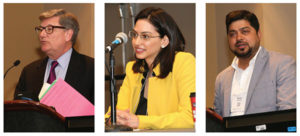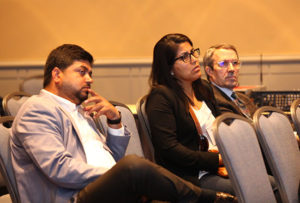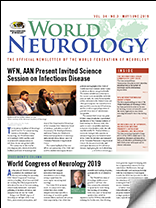By John England, MD, FAAN, and Kiran Thakur
The American Academy of Neurology (AAN) held its 71st annual meeting in May in Philadelphia. During the meeting, the World Federation of Neurology (WFN) and the AAN co-sponsored a unique session on infectious disease and global health.

Left to right: John England, MD, FAAN, Kiran Thakur, MD, and Nischay Mishra, PHD. Photo courtesy of the American Academy of Neurology
The session was co-directed by John England, MD, FAAN, Richard M. Paddison professor of neurology and chair of the Department of Neurology at the Louisiana State University School of Medicine, and editor-in-chief of the Journal of the Neurological Sciences, and Kiran Thakur, the Winifred M. Pitkin assistant professor of neurology and neuroinfectious disease expert at Columbia University Irving Medical Center.
The session highlighted the joint efforts and partnership of the WFN and AAN to combat neurological diseases globally, and highlighted the work of world-renowned scientists on hot topics in infectious disease and global health. The session included presentations on the current acute encephalitis outbreaks (AES) in India, the acute flaccid myelitis (AFM) outbreaks in the United States and other global regions, the central nervous system (CNS) reservoir in HIV infection, and the newly recognized spectrum of post-infectious cases of autoimmune encephalitis.
The session’s first lecture was given by Prof. Manoj Murhekar, lead scientist and director of the National Institute of Epidemiology in Chennai, India, who spoke on acute encephalitis syndrome in Eastern Uttar Pradesh, India. His talk was followed by Dr. Nischay Mishra, a molecular biologist with expertise in advanced diagnostics and bioinformatics at the Center for Infection and Immunity at the Columbia University Irving Medical Center. He discussed molecular and serological discovery in CNS infectious diseases, highlighting his work identifying etiologies in AES outbreaks in India. Dr. Kevin Messacar and Dr. Kenneth Tyler (both at the University of Colorado School of Medicine), two major leaders of AFM investigations and members of the Center for Disease Control and Prevention (CDC) AFM taskforce, discussed features of enterovirus-associated AFM.

Audience at the invited science session. Photo courtesy of the American Academy of Neurology
Their presentations discussed human clinical features as well as an experimental mouse model, which was developed in Dr. Tyler’s laboratory. Dr. Serena Spudich, professor of neurology and division chief of infections and global neurology at Yale University School of Medicine, spoke on “Tapping into CNS reservoirs: single cell RNA sequencing of CSF in HIV.” She provided data on her recent studies using single-cell RNA sequencing, which identified a rare subset of myeloid cells that present a gene expression signature that significantly overlaps with neurodegenerative disease-associated microglia.
Prof. Josep Dalmau, director of the laboratory for the study of the pathogenesis of immune-mediated neuronal disorders at the University of Barcelona, Spain, and world authority on paraneoplastic disorders affecting the nervous system concluded the session with a lecture on viral triggers of autoimmune encephalitis. He highlighted his work in a multicenter prospective study showing that autoimmune encephalitis subsequently occurred in 27% of patients afflicted with herpes simplex encephalitis.
The session emphasized the importance of groundbreaking scientific work to combat neuroinfectious diseases globally and the importance of the WFN and AAN as organizations working together on global health initiatives. Further collaborative educational and scientific programs in infectious diseases, neuroscience, and world health will be presented at the upcoming World Congress of Neurology (WCN), which will be held Oct. 27-31 in Dubai, United Arab Emirates. •
